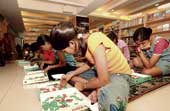 |
 |
| Children participate in the Sudoku championship at Crossword; (above) Sudoku CD-ROM sets on sale at Landmark. Pictures by Pradip Sanyal |
From long flights to leisure sessions to the morning cup of tea ?move over crossword, Sudoku reigns supreme on the puzzle palate.
The Japanese number-crunching game made its debut in the Indian newspapers last year and since then it has had adolescents to adults scribbling inside the nine grids.
To cash in on the Sudoku sweep, Crossword on Saturday organised a Sudoku championship for children aged 12 and above. ?Wherever you go, people scribbling on books and newspapers with pencils has become a common sight. People of all age groups are addicted to Sudoku. So, hosting a Sudoku championship seemed to be a good idea. We would be dividing the teams into two groups. One will comprise contestants between 12 and 20 and the second would be for the above-20,? says Sidharth Pansari of Crossword where more than 50 Sudoku addicts took their places.
Sudoku is played by arranging the numbers 1 to 9 in a nine-by-nine grid so that no two numbers appear in the same row, column or the three-by-three square box. Sodoku, now one of the most popular words searched on the Internet, is known as a newspaper puzzle because all major newspapers around the world carry it every day for their readers. ?Sudoku might be a recent phenomenon in India, but the West got hooked long ago. The craze has climbed to such an extent that newspapers have started organising Sudoku competitions amongst its readers,? says a spokesperson for Funskool which has launched Sudoku as a magnetic board game priced at Rs 275.
From a newspaper puzzle Sudoku has now become a rage on the racks. It has spawned a mini-industry by itself. There are books, CD-ROMs and video games up for sale for the Sudoku army. ?They are picking up the Sudoku books, CD-ROMs and Sudoku video games. Sudoku-related merchandise is selling briskly at our store,? says Gautam Jatia of Landmark.
When it comes to the fan following, the game has a universal appeal. ?I am completely hooked to the game. Unless I solve the entire puzzle in the morning I am unable to start my day. My husband and I often pick up Sudoku puzzle books,? says Puja Ganeriwala, a housewife.
Part of the popularity lies in the simplicity. ?All you need is a puzzle, a pencil and some logic,? smiles 18-year-old Chitvan Mansukhani, a Sudoku fanatic.
Zeeshan Jawed
ABC of archive
 |
| Sanjna Kapoor speaks at the Natya Sodh Sansthan seminar. Picture by Sanjoy Chattopadhyaya |
The need to reach out to more people, create revenue streams, share resources among theatre workers and adopt scientific methods ? a seminar on theatre archiving found stage veterans from across India brainstorming ways to preserve the country?s theatrical past on Thursday.
The interactive session, featuring stage veterans Satyadev Dubey, Rajindernath, Anant Mahapatra, Satish Alekar and Sanjna Kapoor, was hosted by Natya Sodh Sansthan to mark its 25th anniversary.
The theatre archive located in Salt Lake?s EE Block houses manuscripts and writings by theatre veterans, a collection of around 1,400 video tapes, and an impressive range of books in Bengali, Hindi, Marathi, Sanskrit, Manipuri, Assamese, Punjabi, Malayalam, Kannada, Gujarati, Telugu, Tamil and Oriya.
Natya Sodh director Pratibha Agarwal turned the spotlight on the way ahead for theatre archives. ?Should we focus on archiving alone or also branch out to full-fledged research and have an institute affiliation?? asked Agarwal, who has been associated with the archive since its inception 25 years ago.
Shobha Chowdhury, a Delhi-based archivist with whom Natya Sodh is collaborating for the preservation of its video tapes, felt theatre archives needed to make the material accessible to the people. ?We go through the difficult processes of collecting and cataloguing but when it comes to disseminating information we become very possessive of the materials. We need to create an audience for our archive.?
Going against the flow of the talk, Satyadev Dubey stressed the need for specialisation instead of collecting whatever comes one?s way. ?The younger generation hasn?t seen Sambhu Mitra or Utpal Dutt, so they won?t be able to relate to their style of acting unless they are made aware of it. Archives should focus on this aspect.?
Sanjna Kapoor, who is planning to set up an archive at Prithvi Theatre in Mumbai, felt the act of archiving could open up income-generation avenues for theatre. ?When I walk into an archive, it feels inspirational? There are a lot of things like calendars, diaries, mugs that can go to the public and generate funds. We can build awareness by showing 30-second shorts on TV,? she pointed out.
The more important aspect, felt veteran Rajindernath from Delhi, was to create the need for dissemination of archival material, while Rashmi Vajpayee, at the helm of theatre archive Natrang in Delhi, focussed on the need to preserve today?s theatre.
Anant Mahapatra, theatre director from Bhubaneswar, drew attention to dividing up archival work and reducing the load. ?Maybe we could have archives at regional levels which would make the job of collecting material much easier. It would also lessen chances of duplication.?
Research methodology was the concern of Satish Alekar, who supervises a theatre archiving course at Pune University.










